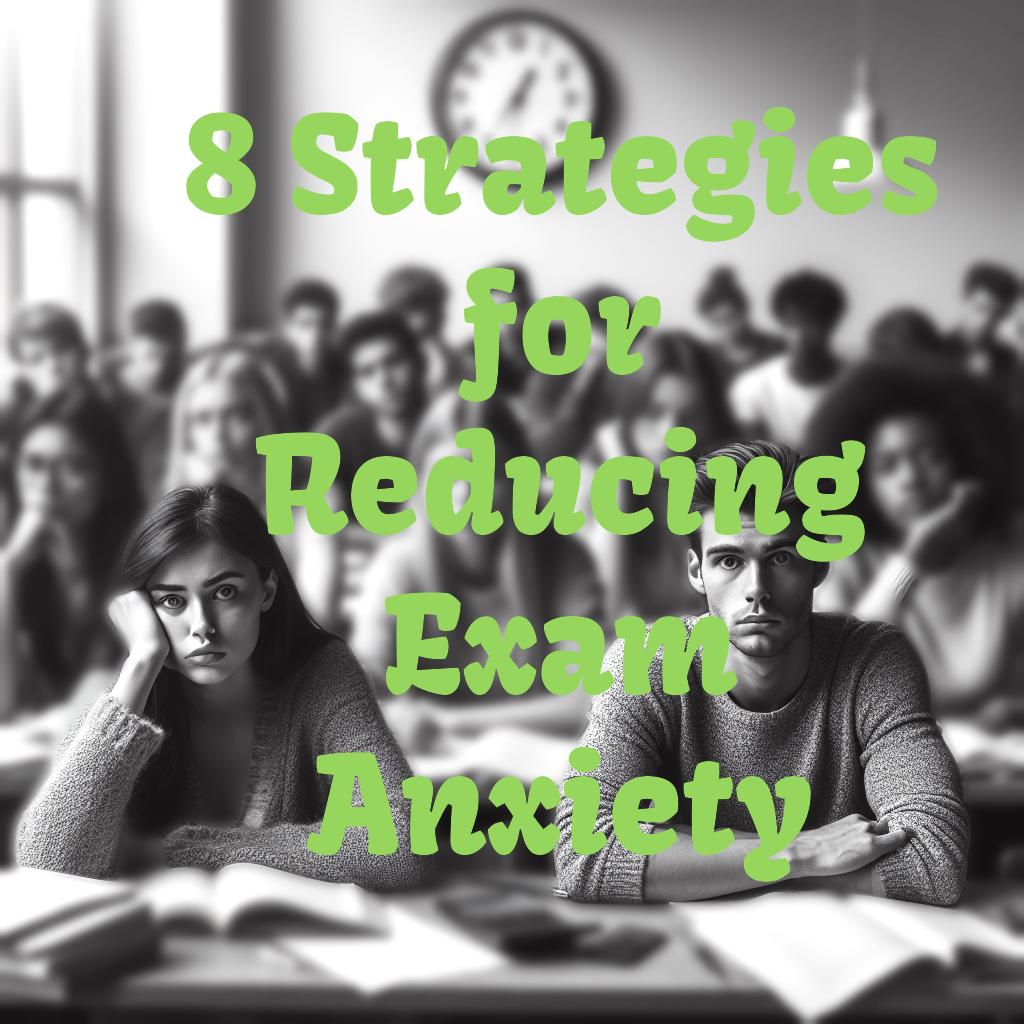Exam anxiety is a common problem that affects many students, especially when they face high-stakes tests. Exam anxiety can cause symptoms such as nervousness, difficulty concentrating, forgetfulness, and physical discomfort. These symptoms can interfere with your performance and lower your confidence. Fortunately, there are some effective strategies that can help you overcome exam anxiety and do your best on any test. In this article, we will discuss eight strategies for reducing exam anxiety, based on scientific research and expert advice.
1. Review the material
One of the best ways to reduce exam anxiety is to be well prepared for the test. This means reviewing the material regularly, not just cramming the night before. Studying in advance can help you reinforce your memory, practice your skills, and identify your strengths and weaknesses. It can also boost your confidence and reduce your fear of the unknown.

To review the material effectively, you should use active learning techniques, such as making summaries, flashcards, diagrams, or quizzes. You should also test yourself under similar conditions as the exam, such as using the same format, time limit, and environment. This can help you familiarize yourself with the exam and reduce your stress.
2. Get enough sleep
Another important strategy for reducing exam anxiety is to get enough sleep, especially the night before the test. Sleep is essential for your brain to consolidate what you have learned, as well as to restore your energy and mood. Lack of sleep can impair your cognitive functions, such as attention, memory, and reasoning. It can also make you more irritable, anxious, and emotional.
To get enough sleep, you should aim for at least seven to eight hours of quality sleep per night. You should also avoid caffeine, alcohol, nicotine, and other stimulants that can disrupt your sleep. You should also follow a regular sleep schedule, avoid naps during the day, and create a comfortable and quiet sleeping environment.

3. Eat well and stay hydrated
Your diet and hydration can also affect your exam anxiety and performance. Eating well and staying hydrated can provide your body and brain with the nutrients and fluids they need to function optimally. Eating well can also stabilize your blood sugar levels, which can prevent mood swings and energy crashes. Staying hydrated can also prevent dehydration, which can cause headaches, fatigue, and confusion.
To eat well and stay hydrated, you should eat a balanced and nutritious diet that includes fruits, vegetables, whole grains, lean proteins, and healthy fats. You should also avoid foods that are high in sugar, fat, or salt, as they can cause inflammation and impair your cognition. You should also drink plenty of water throughout the day, and avoid drinks that are high in caffeine, sugar, or alcohol, as they can dehydrate you and increase your anxiety.
4. Arrive early and prepared
Another way to reduce exam anxiety is to arrive early and prepared for the test. Arriving early can help you avoid the stress of being late, finding a parking spot, or missing important instructions. It can also give you some time to relax, review your notes, or chat with your classmates. Arriving prepared can also help you avoid the panic of forgetting something essential, such as your ID, calculator, or pen. It can also make you feel more confident and in control of the situation.
To arrive early and prepared, you should plan ahead and check the time and location of the exam. You should also pack your bag the night before and make sure you have everything you need. You should also set an alarm and leave enough time for traffic, parking, or public transportation. You should also dress comfortably and appropriately for the weather and the exam room.
5. Use positive affirmations and self-talk
Another strategy for reducing exam anxiety is to use positive affirmations and self-talk. Positive affirmations are statements that express your confidence, ability, and success.Both positive affirmations and self-talk can help you change your mindset and attitude towards the exam. They can also help you cope with negative thoughts and emotions that can undermine your performance.
To use positive affirmations and self-talk, you should identify and challenge your negative thoughts, such as “I’m going to fail” or “I’m not good enough”. You should then replace them with positive thoughts, such as “I’m well prepared” or “I can do this”. You should also repeat these positive thoughts to yourself before and during the exam, either aloud or in your head. You should also praise yourself for your efforts and achievements, and avoid comparing yourself to others.

6. Manage your time and pace yourself
Another way to reduce exam anxiety is to manage your time and pace yourself during the test. Time management and pacing can help you avoid running out of time, rushing, or skipping questions. They can also help you allocate your time and attention according to the difficulty and value of each question. They can also help you maintain your focus and concentration throughout the exam.
To manage your time and pace yourself, you should read the instructions carefully and note the number and type of questions, as well as the time limit. You should then divide your time accordingly and stick to your plan. You should also start with the easiest questions first, as they can boost your confidence and score. You should also skip the questions that you don’t know or are unsure of, and come back to them later. You should also check your answers and review your work if you have time left.
7. Use relaxation techniques
Another strategy for reducing exam anxiety is to use relaxation techniques before and during the test. Relaxation techniques are methods that can help you calm your body and mind, and reduce the physical and mental symptoms of anxiety. They can also help you cope with stress, improve your mood, and enhance your performance.
Some of the relaxation techniques that you can use are:
– Deep breathing: This involves taking slow and deep breaths, and exhaling longer than you inhale. This can help you lower your heart rate, blood pressure, and muscle tension, and increase your oxygen supply to your brain.
– Progressive muscle relaxation: This involves tensing and relaxing different muscle groups in your body, starting from your toes and moving up to your head. This can help you release the tension and stiffness in your muscles, and increase your awareness of your body.
– Visualization: This involves imagining a peaceful and pleasant scene, such as a beach, a forest, or a garden. This can help you distract yourself from your worries, and create a positive and relaxing mood.
– Meditation: This involves focusing your attention on a single object, such as your breath, a word, or a sound. This can help you clear your mind of distracting thoughts, and increase your concentration and calmness.
You can practice these relaxation techniques at home, and use them whenever you feel anxious or stressed. You can also use them during the exam, by taking a few minutes to breathe, relax, and visualize.
8. Seek professional help
The last strategy for reducing exam anxiety is to seek professional help if your anxiety is severe or persistent. Sometimes, exam anxiety can be a sign of an underlying mental health condition, such as generalized anxiety disorder, panic disorder, or social anxiety disorder. These conditions can cause more intense and frequent symptoms of anxiety, and interfere with your daily functioning and well-being. If you suspect that you have a mental health condition, you should consult a doctor, a counselor, or a therapist. They can also help you develop coping skills and strategies for managing your anxiety.
Some of the treatment options that can help you with exam anxiety are:
– Psychotherapy: This involves talking to a trained professional who can help you understand and change your thoughts, feelings, and behaviors that contribute to your anxiety. Some of the types of psychotherapy that can help you with exam anxiety are cognitive-behavioral therapy, exposure therapy, and acceptance and commitment therapy .
– Medication: This involves taking prescribed drugs that can help you reduce the physical and emotional symptoms of anxiety. Some of the types of medication that can help you with exam anxiety are antidepressants, anti-anxiety drugs, and beta-blockers.
– Self-help: This involves using online or offline resources that can help you learn more about your anxiety, and provide you with tips and tools for coping with it. Some of the self-help resources that can help you with exam anxiety are books, websites, apps, podcasts, and online courses.
Conclusion
Apply these strategies and you can face exam anxiety as a challenge that you can overcome with practice and support. You can also enhance your exam preparation, performance, and experience, as well as reduce your anxiety and stress, and boost your confidence and satisfaction.”



